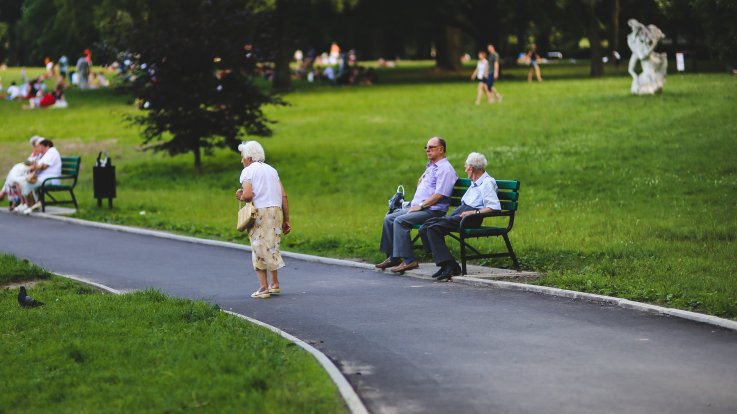World Day of Parkinson's Day

What is Parkinson's disease, what are its causes and symptoms? What kind of treatment is used nowadays? When and why is World Parkinson's Day celebrated? What should care for a senior citizen with this disease look like? The answers to these questions can be found in the following article.
Parkinson's disease is a spontaneous, slowly progressing degenerative disease of the central nervous system. Its name derives from the name of doctor James Parkinson, who was the first to recognise and describe its symptoms in 1817. It is the most common degenerative disease of the nervous system. In Poland, it is estimated that about 80 000 older people suffer from it, including about 15 000 from its advanced form. Many patients, especially at a later stage of their illness, require care. Since not everyone has the opportunity to take care of their loved ones on their own, they often use the help of an elderly caretaker.
Parkinson's disease - causes, symptoms and treatments
This disease is a kind of neurodegeneration, a progressive process of nerve cell degeneration, leading to the death of neurons. This process takes place slowly, sometimes for months or even years, damaging cells that are not working properly.
So far, the exact cause of the disease is unknown. The most common are: genetic predispositions, neuroinfections, toxic factors and oxidative stress.
The disease gives numerous symptoms, including the most characteristic symptoms: increased muscle tension, resting hand tremor, speech and postural reflexes disorders, motor and thinking slowdown, memory deterioration, mood instability, vegetative symptoms (paroxysmal sweating, salivation, urinary incontinence).
So far, no therapy has been invented that inhibits the development of the disease. Symptomatic treatment is used to control the symptoms and make the patient stay fit for a long time. However, this disease progresses and gradually decreases the effectiveness of such treatment. A better therapy is a deep stimulation of the brain or continuous administration of drugs, i.e. to maintain a constant concentration of the brain in the nervous system. Unfortunately, none of these forms of treatment is currently reimbursed by the National Health Fund in Poland.
World Day of Parkinson's disease
World Parkinson's Day is celebrated every year on April 11th. It's James Parkinson's birthday. The day was established in 1997 by the European Parkinson's Disease Association (EPDA) to raise awareness of the disease and contribute to research and development of new treatments. The aim of the introduction of the day was also to support the sick and their relatives and to eliminate discrimination against the sick in workplaces. The symbol of this holiday is a red tulip. On the same day, EPDA, with the support of the World Health Organisation, proclaimed a Charter on the Rights of People with Parkinson's Disease.
The first Polish association was founded on May 20, 1995 - the Warsaw Association of People with Parkinson's Disease. Since 2009 it has been called the Mazovian Association of People with Parkinson's Disease. Since 2004 the Foundation "Living with Parkinson's disease" has also been operating.
How to care for people suffering from this disease?
It is very often the case that the sick require care. Their loved ones are usually not able to reconcile care for the elderly with professional work, so they use the help of professional carers of the elderly. Even those who can devote all their time to taking care of the sick need to rest and then a professional caretaker can relieve the family and, above all, give advice on how to take care of a person suffering from Parkinson's disease.
Sick people are quite often angry, stubborn, crying, have mood changes and are depressed. Patients can overreact if they don't understand the situation. This reaction can also occur during everyday activities such as bathing and feeding. How to deal with such moments when the sick person shows stubbornness, hallucinations and even delusions? It is necessary to learn how to reduce the extreme reactions of the sick person and how to avoid them. The most important thing is to be aware that such behaviour is not a sign of stubbornness, but a reaction to something that the patient cannot control. A sick person doesn't do anything on purpose and isn't malicious. It is important to follow a specific day plan (meals, bathing at fixed times) and to simplify all the activities to be performed by the patient. In addition, all information should be given to the patient slowly. If such reactions occur frequently, the environment should be calmed down. Taking care of an elderly person also requires the caretaker to remain calm, who cannot communicate his or her irritation to the client. It is necessary to try to divert the attention of the patient from the cause of his anxiety and help him to calm down. When the carer is in control, peace is also given to the sick person. It is also worth taking notes about situations in which the patient reacts violently. This can be helpful in finding the causes of such reactions. If the patient often reacts in this way and the caregiver reacts with anger, it means that he or she is overtired and should rest. Then a carer for the elderly can come with help, who will relieve at least for a little bit the burden of a loved one taking care of the sick person.



Komentarze (0)
Zostaw komentarz ⇾